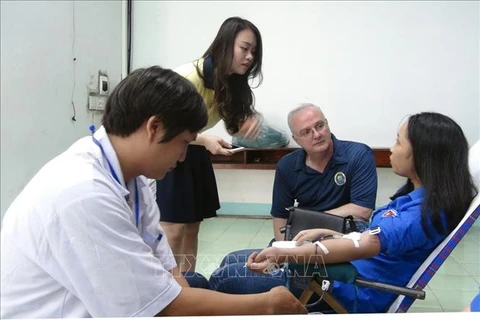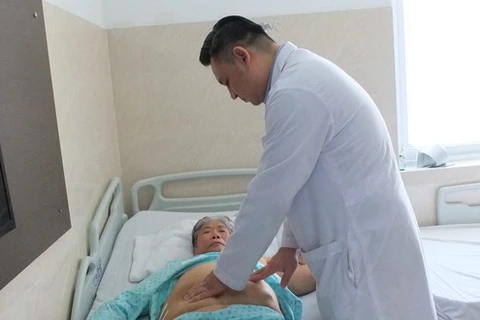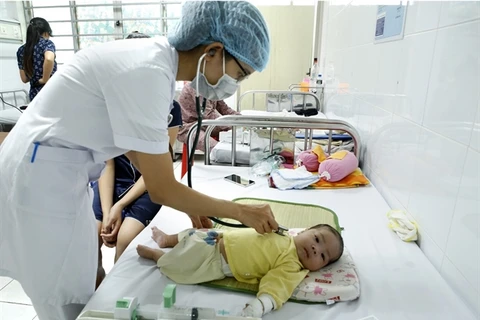HCM City (VNS/VNA) - Although nursing involves high work pressure and stress, many nurses at health facilities throughout the country are reluctant to leave the profession.
“If you choose to work as a nurse, you have to love the job. Whenever patients come into the department for dialysis with a smile in face, we also have fun," said Nguyen Tran Duc, a nurse at Cho Ray Hospital in Ho Chi Minh City for 28 years.
When he began working, he did not know how to arrange his time, but with the assistance of advanced machines and more years of experience, he now no longer feels tired.
“In the hemodialysis department, most patients with chronic kidney failure at the end stage are treated for 20 years, so I see them as my relatives and take care of them with my whole heart and love,” Duc said.
Many young patients are shocked to learn they have chronic kidney failure, he said. Nurses provide psychological assistance to them to allay their fears and give detailed instructions on how to prolong their life.
“I understand the anxiety of patients and their relatives, so when they take out their rage on me, I try to accept it. My friendliness and hospitality can ease their anger and encourage them to continue fighting their disease,” he added.
Nguyen Thi Kim Bang, who has worked as a nurse for 28 years at Cho Ray Hospital, says that she worked in the intensive care unit (ICU) for the first 18 years, and since then has been in the department that treats liver tumours.
“Taking care of patients in any department in the hospital is tiring,” Bang said. “However, I take care of them with a whole heart because I think simply that it is my task and I have to complete my task well so that I don't feel ashamed."
In the department for liver tumours, patients will grumble about service attitude and quality, she says, adding: “But taking care of them for a long time creates emotional bonds. We should make patients feel like the department is their home and they can speak about their problems. When we have deep understanding about patients’ health, it is easier to take care of them and treat them effectively."
Whenever Bang finds out that patients she once treated have died, her heart hurts, she said.
Thai Thi Kim Nga, who has been a nurse for more than 40 years, is the director of nursing at the City International Hospital. She says that nurses should always improve their professional knowledge and skills, and know how to listen to what patients say.
They should also learn about the patients' problems because all patients are not the same, Nga said.
“If nurses have no love for the job, it will be difficult to continue,” she added.
Uong Sy Thao, head of the nursing division in the Mental Health Department at 175 Military Hospital, said that patients in the department often find it difficult to accept their disorder and fight, hit or scratch nurses.
Phan Tien Dung, a nurse at Cho Ray Hospital’s Emergency Department, has had to face irate relatives but has tried to be sympathetic and find the best way to talk to them.
According to a survey on stress among nurses at HCM City Oncology Hospital, conducted in 2017, 60 percent had moderate stress while 19 percent had a high stress level, and the rest a low level.
Most of them felt stress because of work pressure and problems from patients and their relatives.
They said that hospital leaders should set up programmes to help them reduce stress.
Nurses at the Oncology Hospital often face patient overcrowding in inadequate facilities and a shortage of nurses.
According to health experts, hospitals, especially public ones, should add more nurses to reduce work overload and improve quality of care.
Vietnam has the lowest ratio of nurses and midwives to doctors in Southeast Asia, according to Sai Gon Giai Phong (Liberated Sai Gon) newspaper.
Dr Nguyen Hoang Bac, Director of the HCM City University Medical Centre, said that nurses make important contributions to the centre’s development and provide quality healthcare services.-VNS/VNA
“If you choose to work as a nurse, you have to love the job. Whenever patients come into the department for dialysis with a smile in face, we also have fun," said Nguyen Tran Duc, a nurse at Cho Ray Hospital in Ho Chi Minh City for 28 years.
When he began working, he did not know how to arrange his time, but with the assistance of advanced machines and more years of experience, he now no longer feels tired.
“In the hemodialysis department, most patients with chronic kidney failure at the end stage are treated for 20 years, so I see them as my relatives and take care of them with my whole heart and love,” Duc said.
Many young patients are shocked to learn they have chronic kidney failure, he said. Nurses provide psychological assistance to them to allay their fears and give detailed instructions on how to prolong their life.
“I understand the anxiety of patients and their relatives, so when they take out their rage on me, I try to accept it. My friendliness and hospitality can ease their anger and encourage them to continue fighting their disease,” he added.
Nguyen Thi Kim Bang, who has worked as a nurse for 28 years at Cho Ray Hospital, says that she worked in the intensive care unit (ICU) for the first 18 years, and since then has been in the department that treats liver tumours.
“Taking care of patients in any department in the hospital is tiring,” Bang said. “However, I take care of them with a whole heart because I think simply that it is my task and I have to complete my task well so that I don't feel ashamed."
In the department for liver tumours, patients will grumble about service attitude and quality, she says, adding: “But taking care of them for a long time creates emotional bonds. We should make patients feel like the department is their home and they can speak about their problems. When we have deep understanding about patients’ health, it is easier to take care of them and treat them effectively."
Whenever Bang finds out that patients she once treated have died, her heart hurts, she said.
Thai Thi Kim Nga, who has been a nurse for more than 40 years, is the director of nursing at the City International Hospital. She says that nurses should always improve their professional knowledge and skills, and know how to listen to what patients say.
They should also learn about the patients' problems because all patients are not the same, Nga said.
“If nurses have no love for the job, it will be difficult to continue,” she added.
Uong Sy Thao, head of the nursing division in the Mental Health Department at 175 Military Hospital, said that patients in the department often find it difficult to accept their disorder and fight, hit or scratch nurses.
Phan Tien Dung, a nurse at Cho Ray Hospital’s Emergency Department, has had to face irate relatives but has tried to be sympathetic and find the best way to talk to them.
According to a survey on stress among nurses at HCM City Oncology Hospital, conducted in 2017, 60 percent had moderate stress while 19 percent had a high stress level, and the rest a low level.
Most of them felt stress because of work pressure and problems from patients and their relatives.
They said that hospital leaders should set up programmes to help them reduce stress.
Nurses at the Oncology Hospital often face patient overcrowding in inadequate facilities and a shortage of nurses.
According to health experts, hospitals, especially public ones, should add more nurses to reduce work overload and improve quality of care.
Vietnam has the lowest ratio of nurses and midwives to doctors in Southeast Asia, according to Sai Gon Giai Phong (Liberated Sai Gon) newspaper.
Dr Nguyen Hoang Bac, Director of the HCM City University Medical Centre, said that nurses make important contributions to the centre’s development and provide quality healthcare services.-VNS/VNA
VNA
























